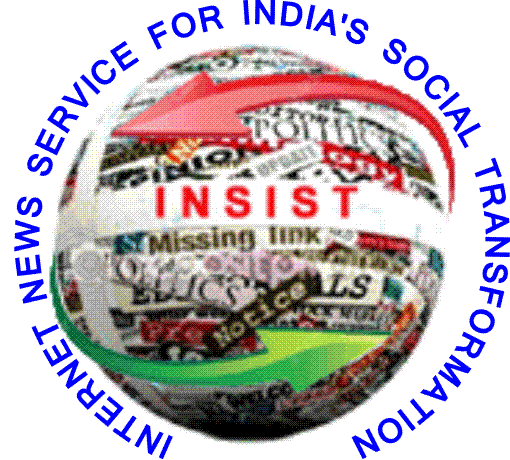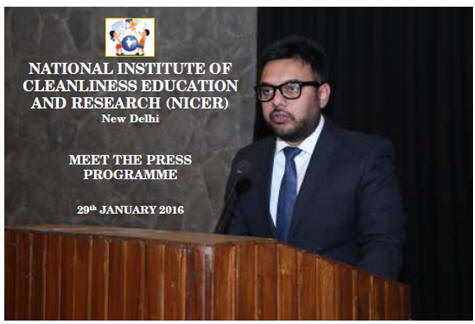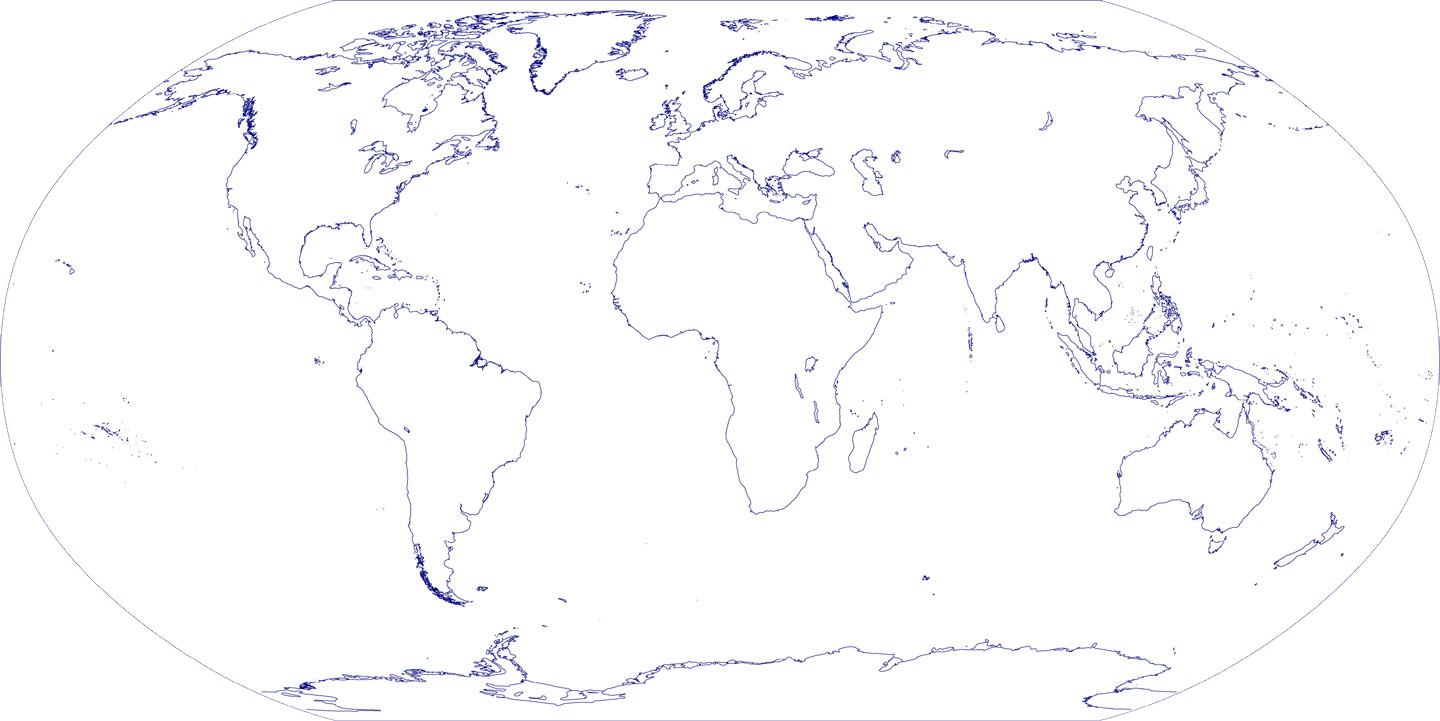INSIST |
 |
 News and Press Release News and Press Release
Internet News Service for India's Social Transformation (INSIST) has been established by leading intellectuals, social scientists, policy makers and educators with a view to propagating news relevant to education and national development. Different types of news, notifications and releases are put on this website. Click any news |
|
|
New Delhi, 29th January 2016
national institute of cleanliness education and research (NICER) to clean up india |
|
|
The newly established "National Institute of Cleanliness Education and Research (NICER)" cosponsored by many universities from all over the country and funded by the Afro-Asian-American Chamber of Commerce, Occupational Research and Development (ACCORD) has designed a masterplan paradigm for cleaning up the country by launching districtwise and districtwide action programmes related to training, production and rehabilitation activities by preparing a competent cadre of young boys and girls equipped with expert knowledge of cleaning, greening, hygiene, sanitation, waste management, garbage disposal, vermiculture, organic farming, water management besides designing and organizing the programmes having social, cultural, educational, vocational, professional, scientific, environmental, economic and positive contents for the optimum development of our country as envisaged by the Prime Minister Shri Narendra Modi.
Announcing this during the "Meet the Press Programme" organized by NICER, the Director and Convener Shri Utkarsh Sharma while briefing the Press further added that many Central and State level Universities have already joined hands with NICER for jointly tackling the issues related to pollution, dirt, garbage, sewage, wastes, human excreta, dust, vehicular emission, hazardous chemicals etc. by organizing Certificate, Diploma, Post Graduate Diploma, Master's as well as Doctoral Programmes in the new and emerging fields of cleanliness, hygiene, sanitation, pollution care, sewerage disposal, garbage management, renewable energy including solar and nuclear power development, organic farming etc.
Stressing the need regarding proper education and training regarding water quality monitoring for the functionaries in the Central / State Government and Semi/Quasi Government Organizations, Utkarsh Sharma explained that many public health workers unfamiliar with the water sector assume that the most important characteristic of a water supply is its improved quality. However, most of the benefit is attributable to improved convenience of access to water in quantity. The Global Water Supply and Sanitation Assessment 2000 Report, the most recent compilation of global statistics on water supply, changed the way that such data are compiled, from the previous unreliable estimates by provider agencies to consumers' responses in population-based surveys. The change required a departure from the old definition of reasonable access to safe water, because most consumers cannot tell whether their water supply is safe. They can, however, state the type of technology involved, and that fact was used to define a new indicator of improved water supply. In the main, improved water supplies could be expected to provide water of better quality and with greater convenience than traditional not improved sources. Elaborating on the need for awareness regarding the Swachchh Bharat Abhiyan, he elucidated that sanitation education will be provided initially to the teachers and students of one lakh schools of all the 688 Districts of India in the light of the fact that sanitation is the hygienic means of promoting health through prevention of human contact with the hazards of wastes as well as the treatment and proper disposal of sewage or wastewater. He also advocated for the refresher training for preventing hazards as they can be either physical, microbiological, biological or chemical agents of disease. Wastes that can cause health problems include human and animal excreta, solid wastes, domestic wastewater (sewage or greywater) industrial wastes and agricultural wastes. Hygienic means of prevention can be by using engineering solutions (e.g., sanitary sewers, sewage treatment, surface runoff management, solid waste management, excreta management), simple technologies (e.g., pit latrines, dry toilets, urine-diverting dry toilets, septic tanks), or even simply by behavior changes in personal hygiene practices, such as hand washing with soap, he observed. Outlining the curriculum for "Cleanliness, Hygiene and Sanitation Education (CHASE)" he said that providing sanitation to people requires a systems approach, rather than only focusing on the toilet or wastewater treatment plant itself. The experience of the user, excreta and wastewater collection methods, transportation or conveyance of waste, treatment, and reuse or disposal all need to be thoroughly considered. The main objective of a sanitation system is to protect and promote human health by providing a clean environment and breaking the cycle of disease, he further mentioned. Highlighting the importance of Hygiene, he said that it is a set of practices performed for the preservation of health. According to the World Health Organization (WHO), "Hygiene refers to conditions and practices that help to maintain health and prevent the spread of diseases. While in modern medical sciences there is a set of standards of hygiene recommended for different situations, what is considered hygienic or not can vary between different cultures, genders and etarian groups. Some regular hygienic practices may be considered good habits by a society while the neglect of hygiene can be considered disgusting, disrespectful or even threatening. Critically examining the urgent need for translating the hopes and the aspirations of the Prime Minister Narendra Modi with a view to cleaning the rivers, ponds and mountains, he said that cleanliness is both the abstract state of being clean and free from dirt, and the process of achieving and maintaining that state. Cleanliness may be wed with a moral quality, as indicated by the aphorism "cleanliness is~ next to godliness", and may be regarded as contributing to other ideals such as 'health' and 'beauty'. Emphasizing on the ongoing procedure or set of habits for the purpose of maintenance and prevention, the concept of cleanliness differs from purity, which is a physical, moral, or ritual state of freedom from pollutants, he further described that purity is usually a quality of an individual or substance, cleanliness has a social dimension, or implies a system of interactions. Cleanliness is indispensable to our modern notion of social perfection. A household or workplace may be said to exhibit cleanliness, but not ordinarily purity; cleanliness also would be a characteristic of the people who maintain cleanness or prevent dirtying. Announcing the step-by-step methodologies of locating the didactical process of educating the children under the scheme "Catch Them Young" on a practical level, cleanliness is thus related to hygiene and disease prevention. Washing is one way of achieving physical cleanliness, usually with water and often some kind of soap or detergent. Procedures of cleanliness are of utmost importance in many forms of manufacturing. All announcements regarding signing of collaboration, association, contracts, representation, memorandum of understanding, affiliation, federation etc. will be made during the Afro-Asian Cleanliness Convention 2016 to be held on 21st March 2016 in the presence of national as well as international dignitaries including the Ambassadors, High Commissioners, Vice Chancellors, Members of Parliament, Governors, Union Ministers, Experts from the fields of environment, cleanliness, water management, hygiene and sanitation, he opined.
|
|








